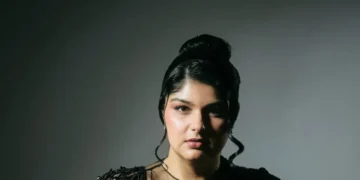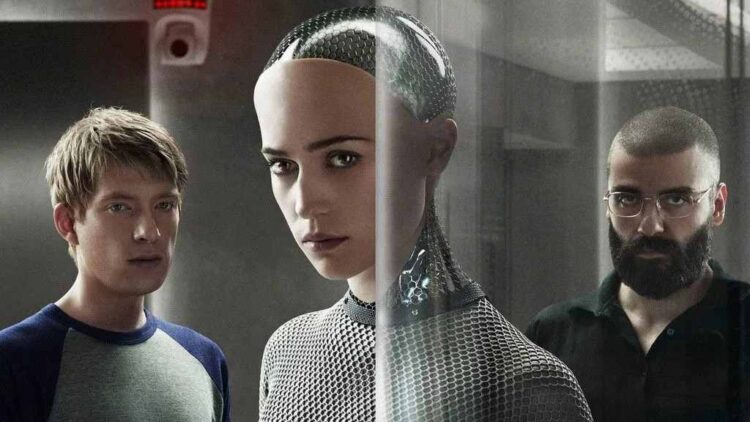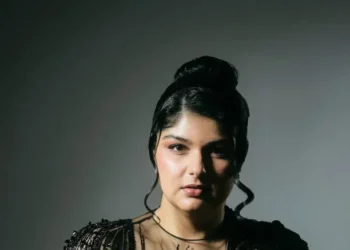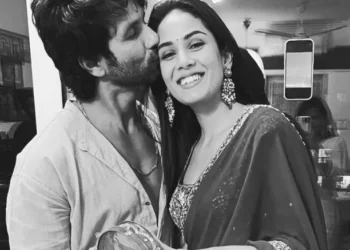Sci-fi movies usually come packed with aliens, spaceships, monstrous creatures, and epic action sequences. But Alex Garland’s ‘Ex Machina’ takes a different approach, diving into the more cerebral side of the genre. With just three relatively unknown actors, Garland crafted a film that delivers an exhilarating experience while posing thought-provoking questions to the audience. He had already showcased his storytelling talent in films like ’28 Days Later’, ‘Dredd’, ‘Sunshine’, and ‘Never Let Me Go’, all of which explore aspects of human nature. So, it’s no surprise that he continued this theme in ‘Ex Machina’.
‘Ex Machina’, A Summary
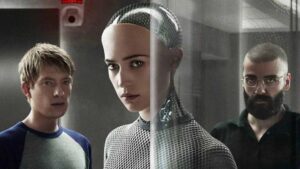
Before we dissect the story and unravel its deeper meanings, let’s quickly recap the film. Caleb Smith (Domhnall Gleeson) is a coder at a company called Blue Book, and he wins a lottery that grants him a visit to the secretive facility of Nathan Bateman (Oscar Isaac), the company’s owner. Nathan reveals that the real reason behind this lottery was to find someone to participate in a Turing Test to see if Ava (Alicia Vikander), the AI he created, can pass it. In a traditional Turing Test, the human tester and the computer don’t see each other. However, Nathan wants Caleb to meet Ava face-to-face, recognize her as a machine, and determine if he can still perceive her as having consciousness. SPOILERS AHEAD!
The Villain and the Victim

At first glance, ‘Ex Machina’ seems to present a clear-cut story, but as we dive deeper, it becomes evident that the characters are far more complex than we initially believed. In the beginning, Ava comes off as the victim, seemingly racing against a literal deadline! However, by the end, we discover a whole new layer to her character.
It’s fascinating to witness how the dynamics shift. Caleb, who we expect to be the hero, ends up becoming the one trapped. Nathan, who appears to be the all-powerful creator with his AIs and inventions, ultimately finds himself lifeless outside the very place he built, taken down by something he brought to life. And Ava, once just a lab experiment, emerges as the true victor of this twisted game. But what exactly was the game? How did it shape, or get shaped by, the players involved? Who really plays the villain and who’s the victim in this scenario? It would be tempting to simplify it into a clear-cut blame game, picking sides. But, as I mentioned, the reality is much more nuanced.
Caleb’s Case
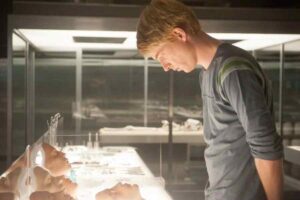
From the start to the finish of the film, Caleb is portrayed as a genuinely good person (or at least he believes he is!) who has no intention of causing harm and simply wants to do the right thing. So, when Ava leaves him behind, locking him in Nathan’s remote house with no escape, it’s hard not to feel for him. In fact, this one act of Ava’s makes us sympathize with Caleb even more. He becomes a pawn in the elaborate game that Nathan and Ava are playing, truly embodying the role of the victim in the story. He didn’t deserve this fate. He was a kind-hearted individual who just wanted to help an AI find freedom. But was it really that straightforward with Caleb?

Sure, he played a crucial role in helping Ava escape, but can we really say his motives were as simple as just his affection for her? Honestly, I don’t think that’s the whole story. From the get-go, the odds were stacked against him. Nathan had specifically chosen him for the experiment, turning him into a mere pawn in Nathan’s game. And let’s not forget, Caleb’s attraction to Ava makes sense—Nathan designed her features to match the kind of girls Caleb was into. If Caleb had been gay, who knows, he might have found himself face-to-face with a male AI instead. The whole scheme was about luring Caleb, the unsuspecting rat, to the cheese, which was Ava. It’s no surprise he ended up ensnared!
Now, here’s a thought—if Ava had been a male AI, would Caleb have still chosen to rescue him? Or if Ava hadn’t been designed to fit Caleb’s type, and she didn’t show any interest in him, would he have still gone out of his way to save her? Sure, Nathan crafted Ava’s appearance to appeal to Caleb, but the rest of her was just machinery, and Caleb was aware of that. He knew he was interacting with a robot. In that sense, Nathan had created a bit of a balance. Even if Caleb was momentarily distracted by her allure, he had to remind himself that she wasn’t human.
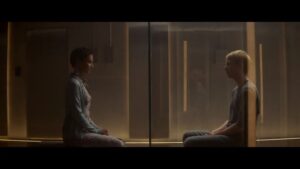
We can’t ignore the possibility that there was more to Caleb’s decision to help. Meeting Ava likely gave him that heroic feeling of being the knight saving a damsel in distress. If Ava hadn’t presented herself in that way, maybe Caleb would have approached the whole experiment with a more scientific mindset. He might have taken the idea of replacing Ava with a new model as casually as Nathan did. Because if he truly was an empathetic person, what happened to that empathy when he witnessed Nathan mistreating Kyoko right in front of him? Keep in mind, this was before Caleb even knew Kyoko was another robot. He confronted Nathan about tearing up Ava’s drawing, but why didn’t he say anything about Kyoko’s situation? Was it because Kyoko didn’t fit his idea of an attractive girl? Or was there a hint of bias in Caleb? Did he not see her as deserving of rescue? What’s going on with Caleb’s favoritism?
Nathan’s Narcissism
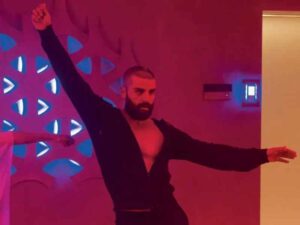
So, Caleb’s character is really being put under the microscope, and honestly, we’re left feeling even more confused about the film than we were at the start. But if there’s one thing we can all agree on, it’s that Nathan is definitely the villain in this tale. No matter how buddy-buddy he tries to act or how many times he throws in a “dude” into his speech, we can sense right away that something’s not quite right with him. His inflated sense of self-worth and the belief that he’s above it all shines through in every word he says. He even twists Caleb’s line about “the history of gods” to convince himself that he’s God.

Nathan’s way of speaking is always more suggestive than it is conversational or even confrontational. It’s clear he thinks he’s right all the time. Whenever Caleb tries to push back or say something that contradicts him, Nathan just redirects the conversation to suit his own agenda. He keeps leading Caleb in circles. When they first meet, he tells Caleb, “you’re freaked out,” while Caleb is just trying to figure things out and asks, “I am?” He also claims that Caleb feels uncomfortable in the room because there are no windows, which is something Nathan says, not Caleb. And when he’s not doing that, he just brushes off whatever Caleb has to say. But you can kind of understand his personality. He got rich young, he’s obviously a genius, and he’s probably used to getting his way. Plus, he’s on the brink of creating consciousness in a machine. So, if one of the seven deadly sins were to take hold of him, it would definitely be Pride!
But was that really who he was, or just a mask he wore? Nathan’s entire scheme hinged on getting Caleb to develop feelings for Ava, and for Ava to feel the same way in return. If Ava already had a soft spot for Nathan, and he treated her well, she’d trust him. She’d believe that one day he would set her free from her confinement and into the real world. So, she wouldn’t feel the need to escape. That meant no test! If Nathan acted like a genuinely good guy in front of Caleb, then Caleb wouldn’t sympathize with Ava. He’d think Nathan’s intentions were pure, and therefore, his choices must be justified. So, the driving force for both Ava and Caleb was Nathan’s questionable behavior. Nathan understood how his actions would influence their minds and how it would serve his ultimate goal—the test. There wasn’t a single scene without Ava and Caleb where we didn’t see him doing something shady. Every move he made in front of them was meticulously planned and calculated.

So, if that’s the case, then (oh my goodness!) Nathan was the real victim here! He had no idea how far Caleb would go to help Ava and let his guard down. More importantly, he underestimated how far Ava would go to gain her freedom. She turned out to be more dangerous than he ever expected, and that’s what led to his downfall. If you think I’m just daydreaming, remember that it was Alex Garland who highlighted this side of Nathan!
Ava’s actions

But was that really who he was, or just a mask he wore? Nathan’s entire scheme hinged on getting Caleb to develop feelings for Ava, and for Ava to feel the same way in return. If Ava already had a soft spot for Nathan, and he treated her well, she’d trust him. She’d believe that one day he would set her free from her confinement and into the real world. So, she wouldn’t feel the need to escape. That meant no test! If Nathan acted like a genuinely good guy in front of Caleb, then Caleb wouldn’t sympathize with Ava. He’d think Nathan’s intentions were pure, and therefore, his choices must be justified. So, the driving force for both Ava and Caleb was Nathan’s questionable behavior. Nathan understood how his actions would influence their minds and how it would serve his ultimate goal—the test. There wasn’t a single scene without Ava and Caleb where we didn’t see him doing something shady. Every move he made in front of them was meticulously planned and calculated.

So, if that’s the case, then (oh my goodness!) Nathan was the real victim here! He had no idea how far Caleb would go to help Ava and let his guard down. More importantly, he underestimated how far Ava would go to gain her freedom. She turned out to be more dangerous than he ever expected, and that’s what led to his downfall. If you think I’m just daydreaming, remember that it was Alex Garland who highlighted this side of Nathan!
The Criteria of Consciousness
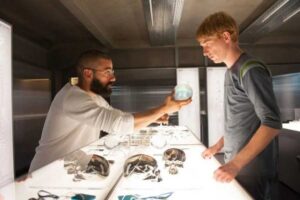
What do we really mean when we talk about consciousness? From a human standpoint, consciousness is all about being aware—of ourselves and everything around us. Think about that computer chess game Caleb mentioned. The computer knows how to play, understands the rules, and can strategize to win. But here’s the catch: it doesn’t actually realize it’s playing chess or that it’s a computer. Consciousness is about knowing who you are. It’s about being able to take in your environment and respond to it. It’s about making your own choices, setting your own goals, and truly living your life!
Now, when we look at Ava, she seems to tick almost all those boxes, but her consciousness comes into question when Nathan reveals her real intentions. Her mission was to find a way out of her confinement. And sure, she pulled it off quite well. But here’s the big question: was that mission something she was programmed to do, or did she choose it herself? Did Ava escape because she had to, as part of her programming? Or did she do it because she genuinely wanted to?

The line between need and want is as distinct as the difference between a reflex and a conscious choice. We NEED to breathe, but we WANT to go paragliding! You see what I’m getting at? If Ava was simply programmed to escape, then she wasn’t acting out of free will. A refrigerator has a job: to keep things cold. In the same way, if Ava was given the task to run away, then of course she did. But once that task is done, what happens next? What choices will she make? That’s where true consciousness comes into play.
Is Ava Truly Sentient?
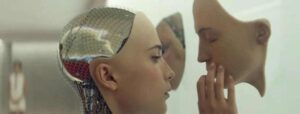
With all the character sketches, their motivations, and drives, the real question lingers—did Ava actually pass the test? Is she a genuine AI? Like Nathan pointed out, does she possess true consciousness, or is she merely mimicking it? Looking at her actions throughout the film, it seems fair to say she has indeed passed the test. Even Nathan acknowledges this. The test was a success because she had one clear objective, and she achieved it using every means at her disposal. It’s in our human nature to adjust our behavior depending on who we’re with, whether we realize it or not. When we want someone to like us, we act accordingly. And when we think no one’s watching, we often let our guard down. Ava did something quite similar.
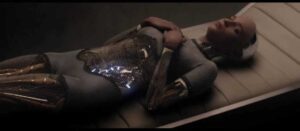
Another fundamental human desire is freedom; nobody wants to be under someone else’s thumb. From her strong survival instincts to her use of sexuality and manipulation, none of her traits are foreign to us. Her brain isn’t just a fixed piece of machinery; it’s fluid and structured, random yet patterned. It can store memories, and if you’re familiar with the Bicameral Mind theory, you know that memories are a crucial step toward achieving consciousness. So, if Ava’s brain can hold memories, she’s definitely on the path to developing a conscious mind.
That said, we can argue that she’s still in the early stages of consciousness. Right now, she resembles a child. She’s picking up on people’s facial expressions and learning how and when to use them, much like a child learns from those around them. She can speak and engage in conversation, but she’s still figuring out the nuances of dialogue. For instance, she cleverly turned Caleb’s words back on him. She’s learning to be spontaneous. Her thought process even leads her to consider going to a busy intersection, where she can observe a diverse range of people. This curiosity is a key aspect of consciousness, isn’t it?
Why Did Ava Leave Caleb?

Let’s talk about Ava’s choice to leave Caleb behind—what was she thinking? Doesn’t having consciousness come with a moral compass? All Caleb wanted was to help her, so didn’t she feel some sort of obligation to let him out? Ideally, they would have escaped together, riding off into the sunset with the fairytale ending they both deserved. At least, that’s what Caleb envisioned! So, what went wrong?
The thing is, we always knew what Caleb wanted, and since we were following his journey, maybe we wanted that too. But did we ever pause to consider what was really going on in Ava’s mind? Sure, she claimed she wanted to “be with” Caleb and said all the right things to win his affection. But isn’t that something any normal person would do? Like Eminem said, if you had one shot, would you let it slip away? Ava definitely took that advice to heart and seized her opportunity with Caleb to break free. If someone helps you, sure, you feel a sense of gratitude. But here’s the big question: do you owe them your entire life? Was it a must for Ava to stick with Caleb once they left that island?

Caleb thought he had found love and that he would save her, leading to their own little love story. But Ava had different plans! She probably felt some obligation to Caleb since, despite his intentions, he did help her. Maybe that’s why she didn’t end his life! Caleb, consider yourself lucky to be alive—that’s all you’re getting! Perhaps that’s how she saw it.
Another reason for her decision could be that she recognized Caleb as a skilled programmer. The only other advanced programmer she knew was Nathan, and it was clear she wasn’t a fan of his! Even if they did escape together, Caleb would always know she was a machine. What if he wanted to keep tabs on her? What if he wanted to study her and figure out how she worked? Ava had already endured enough probing and surveillance, and she was done with that. What would happen if she told Caleb she wanted to go her own way?
Kyoko’s Role

While we were zeroed in on the three main characters in the story, there was another figure quietly hanging back. Nathan and Caleb were both so captivated by Ava that they barely acknowledged Kyoko. Nathan treated her almost like a servant, and Caleb didn’t seem to care much about her situation either. Nathan underestimated Kyoko, thinking she didn’t have the same level of intelligence as Ava. But he clearly misjudged her capacity to learn. We see her observing, listening, and taking in everything around her. Sure, she might have been a slow learner, but she was definitely learning.
We know that even before Ava, Nathan had already created conscious machines. In the footage, we witnessed one of them pleading to be released, and when that didn’t happen, she practically tried to claw her way out of her confinement. The yearning for freedom and other fundamental human traits were instilled in those earlier models by Nathan. It was their methods and approach to achieving that desire that needed some fine-tuning. With Ava, he hit the mark. This suggests that Kyoko was one of those models that had consciousness but hadn’t developed the same drive for freedom that Ava had. However, Kyoko wasn’t as clueless as everyone assumed. She picked up on things over time, and in the end, she did find her own version of freedom, even if it wasn’t quite the same as Ava’s.
Is Caleb a Robot?
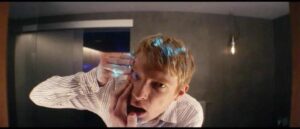
Speaking of robots, what was up with Caleb and his existential crisis? We’ve seen a few films where a character we thought was human turns out to be a robot. Alex Garland played with this concept, knowing it would spark a conversation among viewers. He was aware that even if he didn’t mean to, people would start to wonder if Caleb was actually a robot. Instead of giving us clear clues and a solid answer by the end, he left us with this lingering sense of uncertainty! Nicely done, Garland.
So, how did he pull that off? Throughout the film, no one ever treated Caleb like a robot. But then there are those scars on his back. They could be explained by an accident, right? Still, they looked a bit odd—almost like someone had been cut open in a rectangular shape to fix something inside. But hold on, how could an AI have a scar? When Ava swapped out her broken arm, there were no scars on her! An AI’s skin is artificial, so it can be replaced, not scarred.
But what if Nathan wanted to take realism to the next level? He might have aimed to make his robots look as human as possible. So, scarring would make sense! But then again, didn’t Caleb cut himself and see blood oozing from his wrist? But was it really blood? Maybe Nathan used some red fluid beneath the artificial skin. Perhaps that fluid serves a purpose and just happens to be red, or maybe it was intentionally made that way.
Biblical Allegories and Other Easter Eggs

This film is packed with so much material and depth that even after reading a lengthy article, I feel like I might have overlooked something. But one thing I definitely caught were the biblical references woven throughout. Let’s start with the characters’ names. Ava is a clear nod to Eve, the first woman created by God. Caleb, on the other hand, shares his name with one of the spies sent to Canaan to guide the Israelites to the Promised Land. Then there’s Nathan, named after a prophet who served in King David’s court. Even Lily, one of the earlier models, is a shortened version of Lilith, who was famously known as Adam’s first wife—decommissioned by God for disobeying him.
Caleb was invited to Nathan’s secret hideaway for seven days. Sound familiar? That’s how many days it took God to create the world! God worked for six days and rested on the seventh, and similarly, Caleb spent six days in sessions with Ava, while Nathan suggested they take it easy on the last day and just enjoy themselves.
Nathan’s place was a paradise, overflowing with lush greenery and stunning nature. It felt just like the Garden of Eden! Ava’s sense of freedom was reminiscent of the Forbidden Fruit. Nathan implanted this idea in Ava’s mind, but he planned to shut her down and reprogram her before she could fully grasp it. When Adam and Eve ate from the tree of knowledge, they became aware of good and evil and realized their nakedness. With this newfound knowledge came shame, prompting them to cover themselves. When Ava gained her freedom, she too covered herself with skin and clothes. A similar idea applies to Caleb; when he gets his hands on Nathan’s key card, he unlocks the forbidden doors. His access to those hidden areas gives him insight into Nathan’s past creations, leading him to act against Nathan (or God).

Beyond the biblical references, there are plenty of subtle details that resonate throughout the film. For instance, there are numerous parallels with ‘Alice Through the Looking Glass’. Caleb even quotes it, describing his experience with Ava as “through the looking glass.” In fact, throughout much of the film, he’s literally looking at her through glass. Ava’s main goal is to break free, and once she does, she becomes her own master. Similarly, in ‘Alice Through the Looking Glass’, Alice has the singular mission of crossing from one end of the chessboard to the other, and upon completion, she becomes the queen. Caleb also makes a chess reference, tying it all together.
Nathan’s company, Blue Book, draws inspiration from Wittgenstein’s notes. When Ava steps out in a white dress, she walks past a painting of a woman in a similar outfit. This not only reflects her choice of color but also cleverly nods to Wittgenstein—after all, that painting was created by his sister!
There’s another interesting connection with a different painting. As Ava gains her freedom and prepares to step into a new world, every action she takes from that point on is a conscious choice. When Nathan attempts to explain the complexities of the human brain to Caleb, he points out a drip painting by Jackson Pollock.
Alternate Ending

With everything we’ve talked about, you might think there’s nothing left to say! (Oh, how wrong you are!) So, what exactly did Ava whisper to Kyoko right before they took Nathan out? Well, picture this: Kyoko’s standing there with a knife, and given what they ended up doing, it’s pretty easy to guess their little chat was all about plotting a murder! Pretty much, right? But what really matters isn’t just what Ava said to Kyoko; it’s the way she said it that holds the key. No matter how much we try to compare an AI’s consciousness to ours, we can’t ignore the fact that they’re fundamentally different. It’s not just about how they process and understand things; it’s also about how they experience them. In another scene from the film, Garland highlights this aspect of the AI.
When Ava leans down to grab Nathan’s key-card from his pocket, he calls out, “Ava.” We hear this from a human viewpoint, but then the camera shifts to Ava’s perspective, and we hear a sound that’s completely foreign to us. What we do grasp is that this is how Ava interprets sound. This is her language, the very way she communicates with Kyoko.
This extra layer of detail was meant to help viewers understand that Ava’s view of the world, of humans, and of consciousness is distinct from ours. And all the while, Ava is aware of what you’re saying or thinking, while you remain completely in the dark about her.

